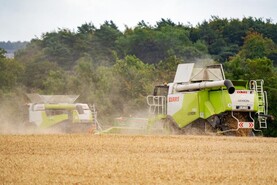The rate of COVID-19 infections in Irish meat plants is extremely low right now, despite very high rates of community transmission of the virus in the general public.
The Irish Farmers Journal understands the positivity rate for COVID-19 tests carried out on meat industry employees is less than 2% right now, compared with positivity rates of almost 15% for COVID-19 tests carried out on the general population in the last week.
It’s understood COVID-19 positivity rates at meat plants remained as low as 2% even when the third wave of COVID-19 infections in Ireland was at its peak two weeks ago and positivity rates in general testing were as high as 20%.
New figures
The new figures came to light as officials from the HSE and the National Public Health Emergency Team (NPHET) briefed members of the Department of Agriculture and the food industry on Tuesday about what they were seeing in terms of COVID-19 rates in the food sector.
Since the outbreak of multiple COVID-19 clusters at a number of Irish meat factories last year, the HSE has been carrying out serial testing of meat industry employees in a bid to contain the virus.
The HSE is understood to be very happy with the results of serial testing at meat plants, but warned that it is still extremely concerned about virus transmission rates in congregated settings such as meat factories.
Peak milk supply
Separately, the Irish dairy industry is hoping it can secure vaccinations for up to 400 key workers at milk processing plants ahead of the weeks of peak milk supply in May 2021.
Essential workers in the dairy industry are due to be vaccinated at level 10 of the Government’s timeline for the roll-out of the COVID-19 vaccine, which would see these workers vaccinated in April or May.
The Irish Farmers Journal understands there are roughly 10 to 15 people at each milk processing plant in the country who are absolutely essential to the smooth running of operations during the weeks of peak milk supply.
While there are up to 16,000 employees in the Irish dairy sector in total, industry leaders would like to see the 400 essential operational staff vaccinated ahead of the peak to prevent any worst-case scenarios due to sickness from infection with COVID-19.






 This is a subscriber-only article
This is a subscriber-only article











SHARING OPTIONS: